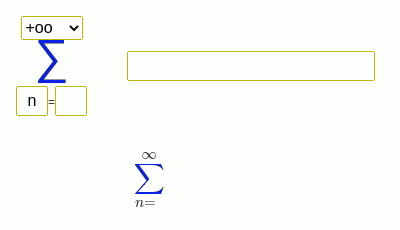Sum of series x^(n+1)/(n(n+1))
The solution
You have entered
[src]
oo ____ \ ` \ n + 1 \ x / --------- / n*(n + 1) /___, n = 1
$$\sum_{n=1}^{\infty} \frac{x^{n + 1}}{n \left(n + 1\right)}$$
Sum(x^(n + 1)/((n*(n + 1))), (n, 1, oo))
The answer
[src]
// /2 (2 - 2*x)*log(1 - x)\ \ ||x*|- + --------------------| | || |x 2 | | || \ x / | ||---------------------------- for |x| <= 1| || 2 | || | || oo | x*|< ____ | || \ ` | || \ n | || \ x | || ) ------ otherwise | || / 2 | || / n + n | || /___, | \\ n = 1 /
$$x \left(\begin{cases} \frac{x \left(\frac{2}{x} + \frac{\left(2 - 2 x\right) \log{\left(1 - x \right)}}{x^{2}}\right)}{2} & \text{for}\: \left|{x}\right| \leq 1 \\\sum_{n=1}^{\infty} \frac{x^{n}}{n^{2} + n} & \text{otherwise} \end{cases}\right)$$
x*Piecewise((x*(2/x + (2 - 2*x)*log(1 - x)/x^2)/2, |x| <= 1), (Sum(x^n/(n + n^2), (n, 1, oo)), True))

Examples of finding the sum of a series
- The Sum of the Power Series
x^n/n
(x-1)^n
- Factorial
1/2^(n!)
n^2/n!
x^n/n!
k!/(n!*(n+k)!)
- Flint Hills Series
csc(n)^2/n^3
- Basel problem
1/n^2
1/n^4
1/n^6
- Harmonic series
1/n
- Grandi's series
(-1)^n
- Alternating series
(-1)^(n + 1)/n
(n + 2)*(-1)^(n - 1)
(3*n - 1)/(-5)^n
(-1)^(n - 1)*n/(6*n - 5)
- Newton–Mercator series
(-1)^(n + 1)/n*x^n
- Exam the series for convergence
(3*n - 1)/(-5)^n

 ((-1)^n)(pi^(2n))/((6^(2n))(2n)!)
((-1)^n)(pi^(2n))/((6^(2n))(2n)!)
 2
2